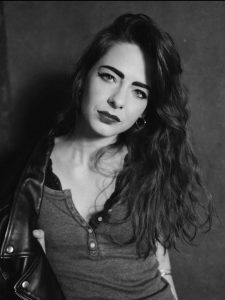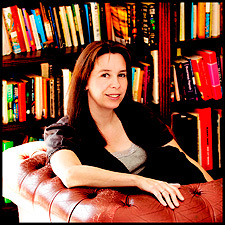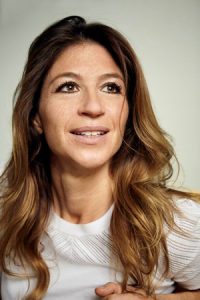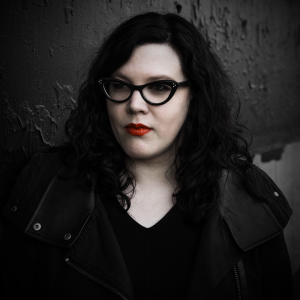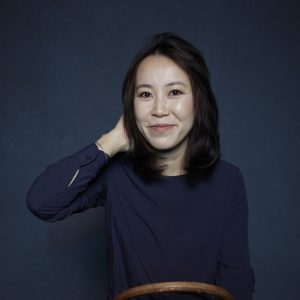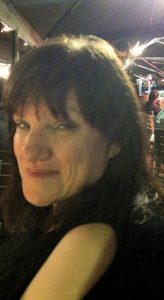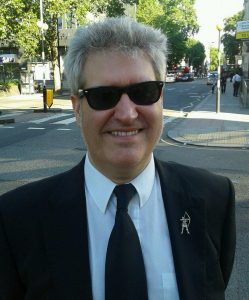IN THESE HALLOWED HALLS – Anthology Interview
“Definition of dark academia in English:
dark academia
- An internet subculture concerned with higher education, the arts, and literature, or an idealised version thereof with a focus on the pursuit of knowledge and an exploration of death.
- A set of aesthetic principles. Scholarly with a gothic edge – tweed blazers, vintage cardigans, scuffed loafers, a worn leather satchel full of brooding poetry. Enthusiasts are usually found in museums and darkened libraries.”
Dark Academia has been a popular genre of late, bolstered by readers on TikTok. We are thrilled today to welcome some of the best authors currently writing in the genre to the Hive, in a round-table interview on In These Hallowed Halls, an anthology of Dark Academia short stories edited by Marie O’Regan and Paul Kane.
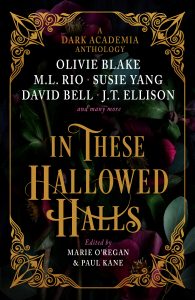 Welcome, represents of In These Hallowed Halls, and please take your seats. All present and correct?
Welcome, represents of In These Hallowed Halls, and please take your seats. All present and correct?
Olivie Blake,
M.L. Rio,
Susie Yang,
Layne Fargo,
Kate Weinberg,
Helen Grant,
Now if you’re quite ready, we shall begin!
Can you briefly describe your story in three sentences or less?
OB: AI can have anxiety too. Also, the worst thing you can do in any academic setting isn’t fail, it’s sleep with your professor.
LF: An archivist catches her goth girlfriend cheating and decides to exact some spooky vengeance after hours in the library.
MR: Disenchanted graduate students resort to grave-robbing to keep the lights on. (Sort of.)
HG: Two students in love become obsessed with an obscure academic department, with hideous repercussions forty years later.
SY: A lonely college student with a penchant for boy-love novels invents romantic scenarios between her professor and another fellow student
KW: An English Lit student turns the tables on the sexually mercenary professor she is sleeping with and unleashes her own dark power.
Tell us a bit about your main character? What kind of personality do they possess?
OB: The main character in my story, psychologist Dr. Tai Thorn, is mostly a third party observer to the real story, although her presence is the inciting incident to the crime that follows—she is the one whose actions determine retribution (justice?) (OR IS IT?) for the wrong that’s already been done. She’s very wary of the institution, whereas anyone else telling the story would be very reverent. Her personal background and general disdain for the so-called hallowed halls makes her a lot of fun as a narrator, but she’s also not one of the chosen ones who walk its halls, which makes her motives much more intimately—and perhaps problematically—derived.
ML: Lou is a hot mess. Towards the end of the story she observes that she’s “never been careful with her life” because “life had never been very careful with her.” She takes a lot of risks and makes a lot of poor moral decisions, which is, I think, a natural reaction when you find yourself in a place where you truly have nothing to lose.
HG: In M.R.James’s classic supernatural story “Count Magnus”, he describes his protagonist thus: “His besetting fault was pretty clearly that of over-inquisitiveness, possibly a good fault in a traveller, certainly a fault for which our traveller paid dearly enough in the end.” My protagonist is a student, not a traveller, but I think the same is true of her.
KW: Lorna Clay is a brilliant, ambitious, highly-sexed college student with loose morals but a shit-ton of mental courage, a one-woman existential threat to the establishment and the patriarchy. I’ve spent far too many years with her as she later stars as a teacher in my DA novel, “The Truants”. This short story is where it all begins. Her origin tale, if you like.
SY: Sophie is a lonely college student in an unsatisfying long term relationship with her cookie-cutter boyfriend. She appears conservative but inside, she longs for “real purpose and romance, true romance, born of suffering and sacrifice and courage.” Unfulfilled, she becomes obsessed with another couple whose relationship appears much more fascinating and forbidden than her own…
What would you study in the academic institution of your story and how well do you think you’d fare?
OB: I highly, highly doubt I would be a technomancer—I cause most technology to malfunction in a way that both dazzles and astounds. But I’d be down to be one of the people they called in to check for demons.
ML: I went and got a PhD in early modern English literature, and my research looks at “madness” and mental disorder in early modern drama. Theatrical representation of insanity is something rich and strange, and I think you have to be a little mad to sell your soul to academia–what we might call tragicomic irony.
HG: I did study the same subject (Literae Humaniores) as my protagonist, at the same university. How did I fare? I got a 2:2. I might have got a 2:1 but unfortunately I had to do a viva and I failed it. I had to identify a single paragraph in Ancient Greek from Thucydides and I got it wrong, alas. I expect my protagonist would have done better.
KW: Like Helen, I also studied at the place where my story is set (Oxford University) and did the same subject (English Lit). So I can tell you exactly how I fared: I was all over the reading, slept through most lectures, took a knee-skid towards essay deadlines and miraculously emerged with a decent degree and a very battered copy of The Secret History.
What draws you to the Dark Academia genre?
OB: Libraries are very sexy. Learning is sexy—and dangerous, as it involves the shattering of existing beliefs and/or selves. The entire culture of higher education is insular and carnivorous—in American law schools, they commonly say that first year they scare you to death, second year they work you to death, third year they bore you to death. Regardless, you’re going to die. Also, knowledge invokes power, and power always comes at the cost of someone else. In academic systems there is a natural order, a gradual culling of the unfit, despite the fact that at best, academia is just a theater for reality. Ethics are almost always ambiguous. Combined, those stakes are irresistible—and not to downplay the dangers of committing blindly to aesthetics, but the internet’s not wrong, the outfits are great.
ML: I got grandfathered into this, if I’m honest. I wrote If We Were Villains back in 2014 when “dark academia” didn’t exist. We called it a “campus novel” then. I didn’t think too much about why I was writing one–it was simply the world I knew. I’d been a Shakespearean actor for about ten years and in school even longer; I had just finished my senior honors thesis and was about to start my master’s degree. “Write what you know” is trite but good advice, so that’s what I did. Working with troupes of actors and coming at it from a very academic angle, I had firsthand experience being part of a cultishly intense artistic and intellectual community. It’s intoxicating, but it’s also dangerous. When everyone is so passionate and under so much pressure, things escalate quickly.
HG: I’m pretty much a lifelong fan of the ghost story writer M.R. James, who was, I think, the granddaddy of Dark Academia. His stories are full of unwary academics who get themselves into terrible scrapes in their pursuit of arcane knowledge.
I’d say also that to an extent I am drawn to it because it resonates with my own experiences. I was the first person in my family ever to go to university, and I was absolutely round-eyed with wonder at the entire thing: the formal hall where there was a latin grace beforehand, the “sub fusc” you had to wear for tutorials, the ancient buildings. At the same time, I had some very emotionally grim experiences at Oxford. Four of my friends from that time are dead, two of them in their twenties. You never entirely walk away from that.
KW: I arrived as a wide-eyed undergrad at Oxford, high on the campus novels I’d devoured in my youth and convinced that I’d find a tribe of thrilling, morally ambiguous friends that forced me to test the outer limits of my personality (but didn’t), and a charismatic teacher that I wanted to sleep with (but really didn’t) so I decided I’d make up a story about it, instead.
SY: I love reading my dark academia/campus novels like TSH and Brideshead but actually I was surprised that WHITE IVY was considered part of this category by readers. There isn’t any part of the story actually set in school. Perhaps it’s the sinister tone of the novel in the coming-of-age part? Either way, it’s been lovely to be included in this community. I think I’m drawn to reading this genre because I’ve never had a spooky autumnal academic experience of my own! I went to pharmacy school in a combined undergrad/grad program which is pretty much the opposite of reading dead philosophers and poets in a gothic library. So dark academia books are pretty much escapist for me and a way to live a college experience I never had.
Rebecca Kuang once stated in a podcast interview* that her novel Babel was written as being in conversation with Donna Tartt’s The Secret History. To what extent do you feel that seminal title of the genre reflects on your own work, if it does at all?
OB: I’ve said very similar things about my best known dark academia work, The Atlas Six. TSH is fundamentally an ethical quandary and examination of class in the shape of a psychological thriller. I think with regard to Pythia, being able to approach TSH’s same themes from a different perspective—from someone who claims not to buy in, and yet reveals the same fatal flaw—is a way of continuing the conversation. The desire to belong aesthetically, institutionally, even with the awareness of being a token—the desire to belong even if that acceptance is conditional—is so real, especially for people of color in academic spaces. The conversation begun in TSH is such an interesting and malleable one, such that all contributions to the subgenre are continuously revealing something new.
ML: Comparisons are inevitable but it’s really a shame that TSH–which is a great novel but hardly perfect; it has definitely served to entrench some of the chronic problems of the genre–so overshadows everything else that came before and after it. Personally I’m excited to see more work from more diverse writers and stories in this category. It’s long overdue.
KW: I think of TSH as the bible of Dark Academia, and my debut, The Truants, has TSH’s fingerprints all over it. I was in love with TSH as an undergrad, but my own experience as a post-grad in Creative Writing at the University of East Anglia with a charismatic, irreverent female professor made me want to challenge some its tropes: what happens if the cast was more diverse, the strongest characters were women not men, and the campus was ugly, Brutalist architecture, undercutting the cliché of the cobbled picturesque?
SY: I can understand the comparisons of WHITE IVY to TSH, mainly in tone and how badly an outsider strives to fit into an elite group, at all costs.
If you were to have your story adapted, what medium would you choose—anime, Netflix series or feature length film? Who would you cast for your main character?
OB: I’d love to see it in a feature film, with quick cuts to reveal all the lies Dr. Thorn tells over the course of her deposition. A dark comedy, Jennifer’s Body style—does anyone know if Diablo Cody is busy?
LF: Love that, Olivie! I’m such a huge Jennifer’s Body fangirl. I could see my story “The Ravages” as a movie for sure. I don’t know who I’d cast as my main character Renee, but her dramatic, death-obsessed girlfriend Natalia is a total Anya Taylor-Joy type. (Olivie chiming back in: PERFECT.)
ML: I’d love to see it get the David Lynch treatment. Like Poe, he has a good grasp of the uncanny.
HG: A film, definitely; I don’t think the story could be extended to a Netflix series without far too much padding. If I were casting it myself (improbable) I’d choose some completely unknown actress, so that nobody would watch it and say, “Oooh, that’s so-and-so”; I’d like them to respond to the character instead.
KW: Actually (slight blush) Netflix did option my Dark Academia debut “The Truants” for a TV series, and until recently was working on a script. It’s now back up for grabs, so I’m considering taking a screen-writing course and having a shot at writing it myself. I would love to see the “Lorna” character who stars in both this story and “The Truants” played by strong female actress like Jodie Comer who, having one of those luminous, ageless faces would probably be able to play her undergrad self as well.
SY: Congrats Kate! WHITE IVY is also optioned by Netflix through Shondaland as a tv series, but is currently on hold from the writers strike. With that said, I love anime so if there’s a chance of writing ANYTHING that would get adapted for that form, I’d be absolutely delighted.
If you could study anywhere (fictional or real), at any time, where and when, and why?
OB: Ah—I’d love a magic school, so a decade ago I’d have had a profoundly different answer, basilisks be damned. I think now I’d be down for almost anywhere without the internet. Is it sad that despite my knowledge of every institution’s ills (and their sources of funding), I’m still my immigrant mother’s daughter, so I long for the symbolic approval of peak Western intellectualism? I guess that’s the point of continuing to interrogate the ethics of academia. Anyway, I definitely know what schools I don’t want to go to—Catherine House, the school in Vita Nostra… oh god, I shudder to think.
Did you create mood boards to help set the atmosphere of your story? If so, what did your mood board consist of?
OB: No, I honestly tried to write anything else besides the story I wrote. My plan was Cruel Intentions meets Gone Girl and what I got was “chronically online pathological liar sasses police.” But pretty much every time I think of an academic setting my mind jumps to Cornell—the isolation of the campus, I think, and the quiet darkness of the swim test requirement, because so many students have drowned in those beautiful Ithaca gorges. Like, that is so dark academia, am I right?
LF: I looked up a lot of droolworthy pictures of real libraries and archives in the UK. One of my favorites—which I was lucky enough to visit, years ago—is Chetham’s Library in Manchester. All that dark wood and leaded glass—swoon!
HG: Layne, there is a gorgeous antiquarian library really close to me, which you would probably love. It’s called Innerpeffray Library and it’s Scotland’s oldest lending library, established in 1680. It has an adjoining chapel and the main reading room looks out onto a graveyard! Best of all, you are allowed to handle the books! They have a copy of the King James Demonology, amongst other things.
As for mood boards, no, I did not create any…
ML: I always have playlists and pinboards. Building Bertie’s house in my imagination was a delightful undertaking, especially because Lou’s research and family background make her so attuned to architectural elements. Because you can only fit so much plot in 30 pages, I went strong on atmosphere.
How did you fare writing in the short story format? Do you have a preference, short story or novel length?
OB: A short story requires a relatively simple idea, a limited world, and maybe one form of narrative trickery, as a treat. I tend to go overboard in all three of those things, but sometimes the most effective way to tell a story is with a hard, fast (relatively, lol) punch to the gut. Can’t beat short form for that. Novel format is where I focus more on character development, but this story benefits from the short form because what’s outside the world of this campus is irrelevant—you can check your ethics at the door, or so the narrator allows herself to believe. That belief and its limited scope—the lack of external consequences that would otherwise be implied by the existence of a larger world—is what creates the story and its theme of how far a person will go for an obsession.
LF: This was my first time writing a short story outside of college writing class assignments, and honestly, I think novels are easier. It was a fun challenge, though!
ML: I second what Layne said. I’m much more comfortable with long-form fiction simply because that’s what I’ve been doing for years, and I always feel like I don’t have enough room to fit a story in less than 10,000 words. Maybe that’s why I picked Poe as a muse for this one; he was a master of the spooky short story and so made for a very good model.
HG: I like both short stories and novels and I can’t really say I have a preference. I write a lot of short stories (I’ve got several more coming out this year) and I like them for several reasons: firstly, it is very satisfying to finish something in a short time frame. A novel takes me maybe a year to write, so it’s a bit of a marathon. Round about the middle I think I will never get to the end. A short story, however, gives you that dopamine hit after a few days’ writing!! The other thing that I like about short stories is that generally I’ve been able to be more experimental and have my own way more than I do with novels. If you write one moderately successful novel you can get kind of stuck in that genre. With short stories I’ve gone all over the place – crime, ghosts, zombies, witchcraft, apocalypse…
Having said that, I do love writing novels because you can explore a far longer narrative, develop the characters more, etc etc.
How did you feel the short story format suited the genre, or does it lend itself better to a full length novel?
OB: For me, this is a question of character development. How much of the character do you have to understand in order to grasp the story? I think you only need a very brief window into Dr. Thorn to see the flaw that leads to one choice, but you would need a lot more time to understand something like a full corruption arc. How a person makes a mistake is one thing, but how they destroy themselves completely is another. She says, upbeat!
SY: Both work! I could read pure descriptive writing on this genre just to be transported.
What dark academia book would you recommend to our readers? And you can’t all say The Secret History – give us some hidden gems!
OB: I came into this anthology an M.L. Rio, Tori Bovalino, and Susie Yang fan, so I’m happy to acknowledge all the other authors here as often as possible! Some other personal favorites are Catherine House by Elisabeth Thomas, Vita Nostra by Marina and Sergei Dyachenko, Vladimir by Julia May Jonas, We Wish You Luck by Caroline Zancan, and I’m sure it doesn’t need to be said, but of course Babel by RF Kuang.
ML: I would also second Vladimir and Catherine House. Most of my favorites are older, though. I love all of Iris Murdoch’s work but especially The Book and the Brotherhood, and I still don’t understand why more people don’t read Eleanor Catton’s first novel, The Rehearsal. It’s an especially good read for anybody with an interest in the performing arts, so maybe I’m a little biased.
LF: Great recs! I just read Vladimir recently, and I’m obsessed. Another dark academia fave of mine is Bad Habits by Amy Gentry—nothing supernatural in that one, just the horrifying behavior of regular humans all too common in academia.
HG: Um. Well, this is difficult because Dark Academia is seen as a fairly recent trend but I am personally a complete fiend for the stories of M.R.James (died 1936) and would definitely point people at those if they want hapless professors and grim deeds in academic settings.
SY: Based on everyone’s rec, I just bought Vladmire and Babel so can’t wait to get started! I’d recommend a classic and one of my favorite novels ever: Stoner by John Williams. It’s a simple story about the life of a nondescript professor, but my god, the emotions and grief that flows through this book. It’s what I’d consider a perfect novel. The ending is sublime.
Finally, what is the one thing you hope readers take away from your writing?
OB: A good time, and maybe a thought experiment. If you want, here’s a wee trinket to play with: who is the most obsessed, and with what?
ML: Unfortunately I write like an academic; all the text is subtext. So I hope readers enjoy the treasure hunt and dig a little deeper to find the meaning in things.
HG: I just hope they will think it was enjoyable (in a chilling way) and well-written – that they might think it has a little of the “wow” factor. But one person did say that the ending of my Dark Academia story was “nauseating” and I was quite pleased with that!
KW: I want young (especially female) people to read it and feel their power; everyone else to read it and tremble a little.
SY: Human insight, and entertainment.
Marie O’Regan and Paul Kane (afterword)
MOR and PK: As you’ll see from the answers given by some of our amazing contributors to In These Hallowed Halls, Dark Academia is a broader church than it might seem at first sight. We wanted to show that range, and to highlight stories from some of the best-loved authors working in the genre today. Having edited the anthology, it’s been interesting to see the authors’ responses to the above questions, and certainly adds insight to the stories we’ve so enjoyed reading and editing. If you’re a fan of Dark Academia, or are interested in the genre and want to dip your toe in the water, then In These Hallowed Halls is a perfect place to jump in. The stories are wide ranging, covering subjects as varied as AI, the dangers of curiosity, revenge (whether for infidelity or other reasons), murder… the list goes on. It’s been a pleasure to work on In These Hallowed Halls with such talented authors, and we hope that you enjoy the anthology.
In These Hallowed Halls is available now – you can order your copy on Bookshop.org
*Open Book on BBC Sounds: Dark Academia with Katy Hays, RF Kuang and Kate Weinberg. Released 29th January 2023.

